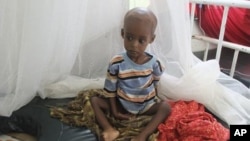The United Nations says it expects famine to reach all regions of southern Somalia within the next four to eight weeks.
A refugee agency spokeswoman told VOA Tuesday the U.N. analysis predicts conditions in the drought- and conflict-stricken nation will only worsen in the coming weeks as food prices rise and the dry season approaches.
She said they are predicting by September that one in three children across the Horn of Africa nation will face acute malnutrition, and two out of every 10,000 people will die daily from hunger - both conditions necessary before the U.N. would declare "famine."
Meanwhile, the United States said Tuesday it was easing restrictions on aid workers to allow them to deliver food to parts of Somalia controlled by militant group al-Shabab.
U.S. sanctions make it a crime to provide any support to al-Shabab, which is trying to overthrow the Somali government. Some aid groups have expressed concern they could face prosecution in the U.S. if they work with the group while trying to help starving Somalis.
Obama administration officials, though, said al-Shabab has diverted some food aid and extorted money from relief groups. One said that aid agencies must have a "common set of standards" not to pay taxes and tolls to the militant group.
International aid groups are rushing to assist an estimated 3.7 million Somalis affected by the drought, many of them children.
The U.N. said more than 12 million people across the Horn of Africa are in need of aid, and the organization has issued an appeal for $1.4 billion.
Earlier Tuesday, British relief agency Oxfam said governments and donors need to fulfill their pledges of aid more quickly. The African Union has announced it will hold a donor summit in Addis Ababa next week.
The United Nations recently declared a famine in two regions of southern Somalia, and has warned that famine conditions could spread to other areas.
The drought has forced hundreds of thousands of Somalis to flee their homes in search of food and water. Many have gone to camps in Mogadishu, while others have fled to crowded refugee camps in Kenya or Ethiopia.
Some information for this report was provided by AP, AFP and Reuters.




